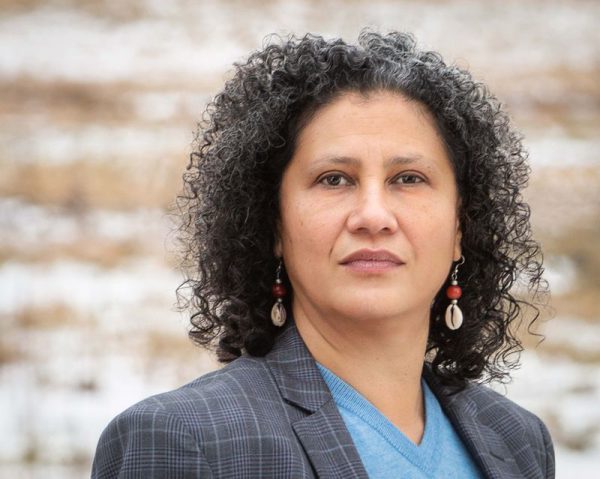A Kalamazoo College faculty member and three of her students are among the people looking to help local houseless women and their young children achieve housing and health equity.

Psychology Jennifer Mills is the grant
writer for the Home Start Initiative, a
local project that aims to help
houseless women and their children.

Visiting Assistant Professor of Psychology Jennifer Mills—with visionary assistance from Playgrown CEO Michelle Johnson—is the grant writer for the Home Start Initiative, a Kalamazoo County-backed project that will build a development of 10 homes with a park, parking area, community courtyard and more near a former makeshift houseless encampment next to the Kalamazoo River at Ampersee Avenue.
The Kalamazoo County Board of Commissioners awarded the Home Start Initiative, a collaboration between Playgrown and the Institute of Public Scholarship, more than $318,000 in April for the sake of addressing a local shortage of affordable housing. Specifically, it will help people living at or below 30% of the Area Median Income (AMI) eventually achieve ownership of the homes in the project.
Mills, an expert in the social determinants of health, said the most exciting part of the project for her is that the initiative is partnering with Western Michigan University’s Homer Stryker M.D. School of Medicine as well as the health department and Healthy Babies Healthy Starts in Kalamazoo County to ensure that women and their children will obtain at least five of those homes. Her students then will build a research agenda around the partnership and track health outcomes.
“We know in public health that a relationship exists between housing equity and health outcomes,” Mills said. “We’re trying to intervene early to give children some of the stability that can impact those social determinants of health. We’ll be working closely with the medical school and the public health department to identify all the measures we want to track.”
A groundbreaking is expected this fall. In the meantime, students such as Janet Fernandez ’25 and Natalie Pineda ’25 will interview the houseless community from the same area at Ampersee and Hotop avenues, where they conducted interviews in a previous first-year seminar.

The day they first showed up for those first-year seminar interviews, Fernandez and Pineda saw community members hurrying to pick up their belongings and worrying about where they could go next with the encampment being shut down.
“I think their stories are really important because they’re often just seen as being ‘the homeless,’” Pineda said. “If we’re acting as a community of Kalamazoo, and if we’re trying to provide better housing for people who live here, the most important place to start is with their stories and asking what their needs are because they’re the ones who are living that situation.”
Taking those stories and providing equity is an important part of sustaining the community, Fernandez said. Both Fernandez and Pineda are from communities, Chicago and Los Angeles respectively, where significant numbers of people are houseless. It’s nothing new to either of them. Yet the Home Start Initiative represents the first time Fernandez has seen a project of its kind.
“We have institutions and places in our cities where houseless people can go and sleep overnight,” she said. “But you’ll never see a program like the one we’re working on, where people get to live in a house and eventually own it. Trying to build that generational wealth is incredibly important.”
One of the first measures of success for the Home Start Initiative would be improved reading scores for the children involved over the next few years.

“Within the first few years of life, a lot of the social determinants of health begin to play a role in how a child’s brain develops and how different processes in the body take place,” said Skyler Rogers ’23, a third K student participating in the project.
“Having a stable, foundational childhood can change things drastically. It can impact a child’s cognitive abilities from a young age, and that’s where third-grade reading levels come into play. By the time a child reaches third grade, you can estimate their likelihood of graduating from high school and moving forward in life.”
As their work progresses, all of K’s representatives contributing to the Home Start Initiative are taking pride in their work. It’s a big investment that might not always represent what some in Kalamazoo believe is a top priority in addressing the issue of houselessness, but Mills and her students aren’t just assuming what the houseless community needs to provide a bare minimum of support. Instead, they’re talking to people to determine their exact needs.
“It feels amazing to see this,” Pineda said. “The amenities provide lifestyle help and can really ground a person to help them get back on their feet. Any other homeless shelter can provide you with a roof over your head for one night. But this project is helping people stay stable for a long period of time. It can help you get a job. If you have children, they provide daycare. All those aspects are important and add to these stories. It’s easy to think the homeless just need somewhere to sleep. But these are people, too, who will get a chance to start their lives again with this project.”
